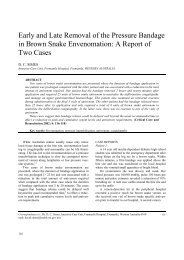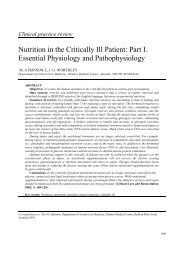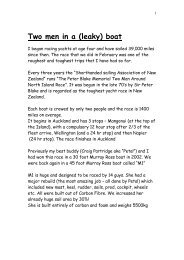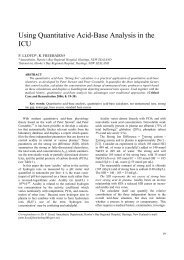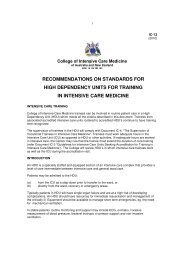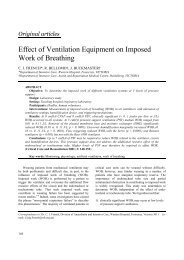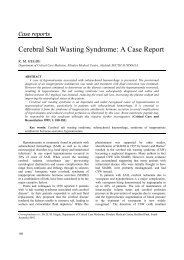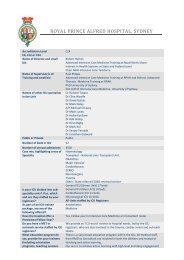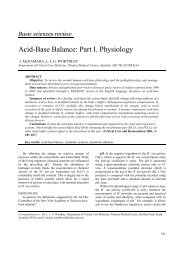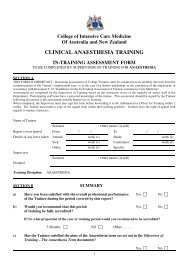Trainee Selection and Registration - College of Intensive Care ...
Trainee Selection and Registration - College of Intensive Care ...
Trainee Selection and Registration - College of Intensive Care ...
Create successful ePaper yourself
Turn your PDF publications into a flip-book with our unique Google optimized e-Paper software.
<strong>College</strong> <strong>of</strong> <strong>Intensive</strong> <strong>Care</strong> Medicine<br />
<strong>of</strong> Australia <strong>and</strong> New Zeal<strong>and</strong><br />
ABN: 16 134 292 103<br />
GUIDELINES FOR THE<br />
SELECTION OF TRAINEES<br />
Republished by CICM: 2010<br />
APPENDIX 32<br />
T-1<br />
(2010)
2<br />
INDEX<br />
Introduction 3<br />
Statement <strong>of</strong> Principles 4<br />
General Procedure 5<br />
Eligibility Criteria 6<br />
<strong>Selection</strong> Criteria 7<br />
Process for the <strong>Selection</strong> <strong>of</strong> <strong>Trainee</strong>s in <strong>Intensive</strong> <strong>Care</strong> 8
3<br />
INTRODUCTION<br />
The <strong>College</strong> <strong>of</strong> <strong>Intensive</strong> <strong>Care</strong> Medicine’s Guidelines for the <strong>Selection</strong> <strong>of</strong> <strong>Trainee</strong>s<br />
are based on the recommendations <strong>of</strong> the Australian Medical Training Review Panel<br />
(MTRP) in their report <strong>Trainee</strong> <strong>Selection</strong> in Australian Medical <strong>College</strong>s 1999. The<br />
MTRP was requested by the Federal Government to identify <strong>and</strong> describe policies<br />
<strong>and</strong> practices <strong>of</strong> <strong>College</strong>s in trainee selection, <strong>and</strong> to derive a best practice<br />
framework that applies selection st<strong>and</strong>ards in a transparent <strong>and</strong> consistent manner.<br />
The MTRP recommends that the selection <strong>of</strong> trainees should be a joint undertaking<br />
by the local health authority or employer <strong>and</strong> the <strong>College</strong> <strong>of</strong> <strong>Intensive</strong> <strong>Care</strong><br />
Medicine. The MTRP also recommends that the <strong>Selection</strong> Committee should<br />
include at least one Fellow <strong>of</strong> the <strong>College</strong> (see Process for the <strong>Selection</strong> <strong>of</strong> <strong>Trainee</strong>s<br />
in <strong>Intensive</strong> <strong>Care</strong>). Appointments <strong>of</strong> successful c<strong>and</strong>idates are made by the local<br />
health authority or employer, using the principles detailed in this document.<br />
These guidelines apply to c<strong>and</strong>idates who wish to be appointed as accredited<br />
trainees in <strong>College</strong> training programs (i.e. new trainees).<br />
The guidelines include:<br />
• A Statement <strong>of</strong> Principles that underpin the selection process.<br />
• The Eligibility Criteria that apply to c<strong>and</strong>idates.<br />
• The <strong>Selection</strong> Criteria that address academic achievements <strong>and</strong> capacity,<br />
previous <strong>and</strong> potential clinical performance, <strong>and</strong> desirable personal attributes<br />
that relate to the practice <strong>of</strong> intensive care.<br />
• The Processes for <strong>Selection</strong> that outlines steps to be taken in selecting<br />
trainees.
4<br />
Statement <strong>of</strong> Principles<br />
The <strong>College</strong> <strong>of</strong> <strong>Intensive</strong> <strong>Care</strong> Medicine strives to foster the highest quality patient<br />
care through the advancement <strong>of</strong> education, pr<strong>of</strong>essional st<strong>and</strong>ards, <strong>and</strong> the<br />
science <strong>and</strong> practice <strong>of</strong> intensive care medicine. The following principles <strong>of</strong><br />
selecting trainees for the <strong>College</strong>’s training program are based on the commitment<br />
<strong>of</strong> the <strong>College</strong> to realize this goal.<br />
1. The <strong>College</strong> supports a selection process that will result in enrolling the best<br />
possible c<strong>and</strong>idates into its training program.<br />
2. The selection process should be based on equal opportunity without prejudice,<br />
regardless <strong>of</strong> gender, race, religion, age, or other personal attributes provided<br />
that they do not impair the c<strong>and</strong>idate’s pr<strong>of</strong>essional <strong>and</strong> clinical performance.<br />
3. The selection process should follow documented procedures, with c<strong>and</strong>idates<br />
having access to published criteria on eligibility <strong>and</strong> selection, <strong>and</strong> to an<br />
appeal process.<br />
4. The selection process should be subject to an on-going evaluation.<br />
5. The selection process is an integral part <strong>of</strong> the <strong>College</strong>’s endeavour to<br />
produce the best possible specialists in intensive care medicine.
5<br />
General Procedure<br />
1. The <strong>College</strong> <strong>of</strong> <strong>Intensive</strong> <strong>Care</strong> Medicine accredits <strong>Intensive</strong> <strong>Care</strong> Units for<br />
training.<br />
2. Hospitals <strong>and</strong> other institutions select <strong>and</strong> appoint junior medical staff to<br />
their units <strong>and</strong> departments.<br />
3. The <strong>College</strong> <strong>of</strong> <strong>Intensive</strong> <strong>Care</strong> Medicine registers trainees for its<br />
vocational training program.<br />
Note: Training posts in <strong>Intensive</strong> <strong>Care</strong> Units are frequently occupied by trainees from other<br />
disciplines e.g. internal medicine, surgery, who have no intention <strong>of</strong> completing<br />
specialty training in intensive care.<br />
Accreditation <strong>of</strong> Units for Training in <strong>Intensive</strong> <strong>Care</strong><br />
The <strong>College</strong> reviews <strong>Intensive</strong> <strong>Care</strong> Units on a regular basis to ascertain their<br />
suitability for training in intensive care medicine. Inspections are carried out<br />
according to Policy Document IC-3 “Guidelines for <strong>Intensive</strong> <strong>Care</strong> Units Seeking<br />
<strong>College</strong> Accreditation for Training in <strong>Intensive</strong> <strong>Care</strong> Medicine”.<br />
Units meeting the specified criteria are approved for training. The duration <strong>of</strong><br />
training in a given unit may be restricted based on case load, case mix, severity <strong>of</strong><br />
illness <strong>and</strong> specialist supervision. The number <strong>of</strong> training posts in a unit accredited<br />
for training is normally unrestricted.<br />
Appointments to training positions in accredited units are made by the Hospitals or<br />
institutions. The <strong>College</strong> expects that the following principles will be incorporated<br />
into the selection <strong>and</strong> appointment process.
6<br />
Eligibility Criteria<br />
The <strong>College</strong> <strong>of</strong> <strong>Intensive</strong> <strong>Care</strong> Medicine considers as eligible c<strong>and</strong>idates for<br />
selection into its vocational training program, any medical practitioner:<br />
1. Who is registrable with the medical licensing authority <strong>of</strong> the region in which<br />
accredited <strong>College</strong> training will be undertaken, <strong>and</strong><br />
2. Who has completed 12 months <strong>of</strong> general hospital experience after graduation,<br />
according to the <strong>College</strong> Regulation 5.2, <strong>and</strong><br />
3. Who is free from alcohol <strong>and</strong> chemical abuse, <strong>and</strong><br />
4. Who is willing to comply with the rules <strong>and</strong> procedures <strong>of</strong> <strong>College</strong>.<br />
Note: A medical practitioner can register <strong>and</strong> commence basic training with the <strong>College</strong> as<br />
a <strong>Trainee</strong> on completion <strong>of</strong> 12 months whole time rotating duties in a hospital<br />
(general hospital experience) after graduating from a medical school.
7<br />
<strong>Selection</strong> Criteria<br />
C<strong>and</strong>idates for the <strong>College</strong>’s vocational training program should be selected based<br />
on principles as stated in the section Statement <strong>of</strong> Principles, eligibility as stated in<br />
the section Eligibility Criteria, <strong>and</strong> the following <strong>Selection</strong> Criteria:<br />
1. Pr<strong>of</strong>essional St<strong>and</strong>ards<br />
1.1 Commitment to pursue a career in intensive care medicine <strong>and</strong> the<br />
capacity to complete the training program.<br />
1.2 Past academic record, work experience, <strong>and</strong> performance.<br />
1.3 Pr<strong>of</strong>essional expertise required to practise as a competent, caring<br />
specialist in intensive care. Desirable abilities to consider include:<br />
1.3.1 Excellent clinical skills.<br />
1.3.2 Good management skills.<br />
1.3.3 An aptitude to cope with stress.<br />
1.3.4 A motivation to behave pr<strong>of</strong>essionally in a manner that earns<br />
respect.<br />
1.3.5 An underst<strong>and</strong>ing <strong>of</strong> medical ethics.<br />
1.4 Commitment to undertake continuing education <strong>and</strong> quality assurance<br />
activities.<br />
2. Personal Attributes<br />
2.1 Health <strong>and</strong> conduct - the ability to function pr<strong>of</strong>essionally without seriously<br />
endangering oneself or others.<br />
2.2 Interpersonal <strong>and</strong> communication skills – the ability to relate to <strong>and</strong><br />
communicate positively <strong>and</strong> appropriately with patients <strong>and</strong> others.<br />
2.3 Reliability <strong>and</strong> responsibility - the ability to be accountable <strong>and</strong><br />
dependable with regard to oneself <strong>and</strong> others.<br />
2.4 Team work - the ability to underst<strong>and</strong> one’s responsibilities <strong>and</strong> to work<br />
effectively <strong>and</strong> co-operatively with patients <strong>and</strong> colleagues.<br />
2.5 Insight - the ability to accept feedback about oneself, <strong>and</strong> to seek help <strong>and</strong><br />
advice when needed.<br />
2.6 Altruism - the ability to attend to the needs <strong>of</strong> others, with an awareness <strong>of</strong><br />
their rights <strong>and</strong> equal opportunities.
8<br />
Process for the <strong>Selection</strong> <strong>of</strong> <strong>Trainee</strong>s in <strong>Intensive</strong> <strong>Care</strong><br />
The <strong>College</strong> <strong>of</strong> <strong>Intensive</strong> <strong>Care</strong> Medicine supports a non-discriminatory selection <strong>and</strong><br />
appointment process that conforms to national <strong>and</strong> regional st<strong>and</strong>ards in human<br />
resource management <strong>and</strong> complies with relevant legislation. It accepts that there<br />
will be differences in detail between processes for the selection <strong>of</strong> trainees in the<br />
States <strong>of</strong> Australia <strong>and</strong> New Zeal<strong>and</strong>. It also notes that it does not employ trainees.<br />
<strong>Trainee</strong>s have service obligations to their employer as well as training obligations to<br />
the <strong>College</strong>.<br />
A fair <strong>and</strong> transparent selection <strong>and</strong> appointments process, incorporating procedural<br />
fairness <strong>and</strong> natural justice, must be underpinned by the following principles :<br />
1. Training posts must be advertised in regional <strong>and</strong> preferably national<br />
newspapers <strong>and</strong>, when appropriate, in pr<strong>of</strong>essional journals. Electronic media<br />
advertising may also be considered. A nationally consistent timetable for the<br />
placement <strong>of</strong> advertisements <strong>and</strong> closure <strong>of</strong> applications, prior to a major round<br />
<strong>of</strong> annual appointments is recommended.<br />
2. A position description should be available to all applicants. It should include<br />
eligibility <strong>and</strong> selection criteria <strong>and</strong> be consistent with <strong>College</strong> requirements. It<br />
should also detail such pr<strong>of</strong>essional matters as:<br />
• duty patterns<br />
• sub-specialty experience <strong>and</strong> rotations<br />
• leave entitlements<br />
• tuition patterns<br />
• the form <strong>of</strong> the required application<br />
The closing date must allow reasonable time for applications to be completed<br />
<strong>and</strong> submitted.<br />
3. For appointments that require a <strong>Selection</strong> Committee, that committee should:<br />
(a) remain unchanged for any given round <strong>of</strong> appointments;<br />
(b) include at least one Fellow <strong>of</strong> the <strong>College</strong> <strong>of</strong> <strong>Intensive</strong> <strong>Care</strong> Medicine;<br />
(c) endeavour to have gender balance;<br />
(d) include employer representative(s);<br />
(e) include departmental representative(s)<br />
(f) independent community representative(s)<br />
4. Formal instruction <strong>of</strong> <strong>Selection</strong> Committee members by the convening authority<br />
as to their tasks will normally be necessary. Principles <strong>and</strong> suggested criteria
9<br />
as set out above must be known to all committee members <strong>and</strong> followed for all<br />
c<strong>and</strong>idates being considered at each appointments round. <strong>Selection</strong> criteria<br />
should be objective <strong>and</strong> consistent with the requirements <strong>of</strong> the employer <strong>and</strong><br />
the <strong>College</strong>.<br />
5. The process to be followed by the Interview Committee must be prospectively<br />
set out <strong>and</strong> followed for all c<strong>and</strong>idates. Interview Committees should not be<br />
large. Three to five members will ordinarily be appropriate.<br />
6. When development <strong>of</strong> a ‘short list’ <strong>of</strong> c<strong>and</strong>idates is necessary, this must be<br />
undertaken by the <strong>Selection</strong> Committee. The criteria for its development must<br />
be prospectively established, but in general terms will involve all applicants<br />
with adequate academic records (as determined from the curriculum vitae) <strong>and</strong><br />
references. Unsuccessful c<strong>and</strong>idates must be notified as soon as possible that<br />
they will not be considered further.<br />
7. All short listed c<strong>and</strong>idates should be interviewed. C<strong>and</strong>idates must be given<br />
sufficient notice <strong>of</strong> interview to allow them to be present <strong>and</strong> to prospectively<br />
consider their responses to the selection criteria.<br />
7.1 Questions should be pre-determined <strong>and</strong> should be put to all applicants.<br />
They should only relate to the selection criteria.<br />
7.2 Interviews should be <strong>of</strong> approximately the same duration.<br />
7.3 As necessity requires, interviews may be face-to-face, by telephone or a<br />
combination, although face to face is preferred.<br />
7.4 There should be opportunity for applicants to ask questions <strong>and</strong> to<br />
comment on matters related to process.<br />
8. The appointments process followed by the <strong>Selection</strong> Committee must take<br />
account <strong>of</strong> information obtained from the application, from referee reports <strong>and</strong><br />
from the interview. The decision making process including the weighting <strong>of</strong><br />
these components should be prospectively established. It should be based on<br />
material relevant to the matter at h<strong>and</strong>.<br />
9. A record <strong>of</strong> proceedings should be kept, as should all <strong>of</strong>ficial documents used<br />
by the Committee in arriving at its decision until it is clear that there will be no<br />
challenge to decisions made by the Committee.<br />
10. Unsuccessful applicants should be <strong>of</strong>fered feedback when advice could be<br />
given under one <strong>of</strong> the following headings:<br />
10.1 Suitable for appointment <strong>and</strong> training but no post available at present.<br />
10.2 Not suitable now, but prospects <strong>of</strong> meeting selection criteria make future<br />
appointment possible.<br />
10.3 Not suitable for appointment <strong>and</strong> unlikely to achieve selection criteria.
10<br />
11. In the case <strong>of</strong> re-appointment <strong>of</strong> existing trainees, the following matters should<br />
be noted:<br />
11.1 It is not permissible to use information obtained as part <strong>of</strong> the <strong>College</strong> Intraining<br />
Assessment program in the selection process.<br />
11.2 Those applicants who are already within the training program should<br />
have indicators <strong>of</strong> satisfactory progress. They would then normally be<br />
given priority for re-appointment.<br />
11.3 It remains the responsibility <strong>of</strong> the trainee to seek out <strong>and</strong> apply for<br />
training positions to meet <strong>College</strong> training requirements.<br />
12. Consideration must be given to specific training requirements <strong>of</strong> the <strong>College</strong> as<br />
detailed in Regulation 5 relating to Training <strong>and</strong> Examinations. For example:<br />
• Training periods less than six months require prior approval from the<br />
Censor. A period <strong>of</strong> not less than three months may be approved when it<br />
is part <strong>of</strong> an approved training program.<br />
• Part-time training is available <strong>and</strong> is subject to specific <strong>College</strong><br />
requirements.<br />
13. C<strong>and</strong>idates must know that an appeals mechanism is available which would<br />
follow the regulations <strong>of</strong> the employing authority or the <strong>College</strong>. Grounds for<br />
appeal might include:<br />
13.1 Evidence that the established process was not followed.<br />
13.2 Evidence that relevant information, available at the time <strong>of</strong> application,<br />
was not considered by the <strong>Selection</strong> Committee.<br />
13.3 The existence <strong>of</strong> new <strong>and</strong> relevant information, which was not available to<br />
the c<strong>and</strong>idate on the closing date for applications.<br />
Promulgated by FICANZCA: 1998<br />
Updated by JFICM: 2002, 2004<br />
Republished by CICM: 2010



